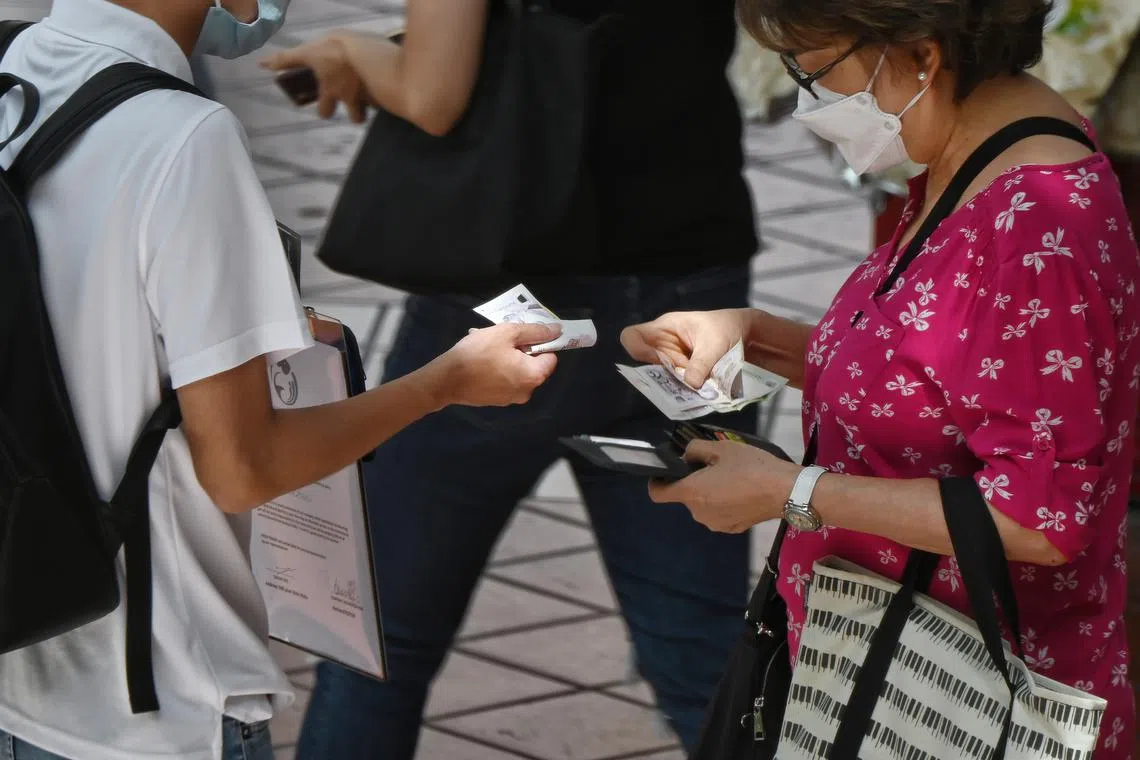Subsidised screening, consultancy services to help S’pore charities mitigate money laundering risks
Sign up now: Get ST's newsletters delivered to your inbox

The screening service will help charities check the names of individuals or entities against sanction lists, watchlists and negative news reports.
ST PHOTO: KUA CHEE SIONG
SINGAPORE - A new panel offering screening and consultancy services will help charities better protect themselves from being misused for money laundering and terrorist financing.
The panel is part of a suite of measures launched by the Office of the Commissioner of Charities (COC) and Charity Council on Oct 2 to strengthen governance capabilities and build up public trust in charities.
The other initiatives are aimed at encouraging the adoption of environmental, social and governance (ESG) practices to garner greater support from stakeholders, and supporting dispute resolution in smaller charities.
The panel will offer due diligence screening for charities at a subsidised rate and help them check the names of individuals or entities against sanction lists, watchlists and negative news reports.
It was set up by the Institute of Singapore Chartered Accountants and the Office of the COC.
It will also provide consultancy services that can help charities to identify and assess risk areas in their operations and funding sources, and help draft procedures to mitigate them.
There is no indication that charities in Singapore had been involved in or misused funds for money laundering and terrorist financing, said the Ministry of Culture, Community and Youth (MCCY) in a statement on Oct 2.
However, the refreshed Singapore Terrorism Financing National Risk Assessment 2024 report highlighted that the understanding of the risk of abuse for terrorist financing still varies among charities, it added.
In October 2023, The Straits Times reported that at least five of the accused involved in a $3 billion money laundering case
This includes at least $52,000 to special education school operator Rainbow Centre, and at least $15,000 to the National Kidney Foundation.
Some of the charities ring-fenced the money, while others lodged police reports and planned to surrender the cash to the police.
Speaking at the Charity Governance Conference at the Parkroyal Collection Marina Bay hotel, Minister for Culture, Community and Youth Edwin Tong said charities are sometimes seen as softer and more vulnerable targets.
He said: “We’ve heard many requests for more robust measures and education to safeguard charities from being exploited for illicit purposes like money laundering and terrorist financing.
“We have to acknowledge that the charity sector remains vulnerable to being unknowingly exploited for illicit purposes, given the inherent risk related to the nature of the activities and the locations in which charities operate beyond Singapore.”
The COC has also partnered law firm WongPartnership to develop a guide on policies and procedures, available on the Charity Portal,
Selected charities with overseas beneficiaries can also tap enhanced due diligence screening services from early 2025 provided by TT Foundation Advisors, Temasek Trust’s philanthropy advisory services arm.
Another initiative announced by Mr Tong on Oct 2 is a new guide that will offer practical and tailored steps to support charities in adopting ESG practices.
Developed by the Charity Council together with professional services firm KPMG, it is expected to benefit more than 2,300 charities.
By integrating ESG principles into their operations, charities can garner greater stakeholder support while contributing to sustainable development and driving social impact in the communities they serve, MCCY said.
Workshops will be held in the first half of 2025 to support charities in implementing these practices.
The COC and Pro Bono SG are also looking to launch a pilot programme to offer mediation services to smaller charities by the second to third quarter of 2025. This may include resolution of internal disputes and inter-charity conflicts.
MCCY said poorly managed conflicts can drain resources and undermine public confidence in a charity’s integrity and effectiveness.
“By offering mediation as a viable alternative to litigation, the pilot programme aims to address disputes within charities amicably and professionally,” it said.
Ms Charis Chan, assistant secretary-general for operations at the Singapore Red Cross Society, told ST that as a charity in Singapore with one of the largest overseas operations, it has always prioritised guidelines to screen partners and ensure money is going to the right place.
The charity developed its own guidelines more than a decade ago, but said the new guide by WongPartnership will help it improve practices.
Ms Chan said: “It will also be very helpful for smaller organisations that may not have their own guidelines – this will make it easier for them to remain safe.”
The upcoming mediation service will also be a good pillar of support for smaller charities, she added.
“For Singapore Red Cross, we are lucky to have volunteers with backgrounds in law that we can depend on when issues arise. But it is really not easy for a smaller charity, whose resources all go towards humanitarian work. A mediation service like this would help them further focus on doing good, instead of diverting attention to settling conflict.”
Dr Christina Tiong, chief executive of the Home Nursing Foundation, said a mediation service would be a refreshing resource.
“While we have our own internal framework for conflict management within the organisation, having this resource would be very helpful for external conflicts, like when we engage vendors that do not deliver,” she said.
Dr Tiong added that the new guide on ESG practices will be useful in helping organisations develop programmes and monitor their impact.



